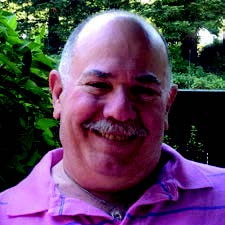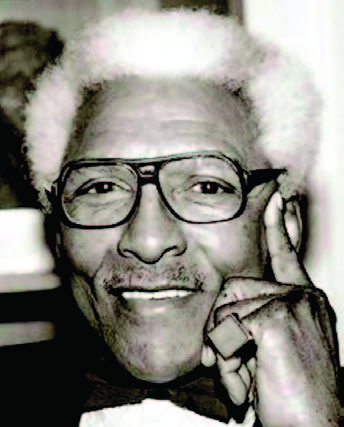 Bayard Rustin believed devoutly in the American ideal, the “self-evident” truths that all of us “are created equal” and endowed “with certain unalienable Rights,” including “Life, Liberty, and the pursuit of Happiness.” Working for civil rights and pushing for meaningful change, he devoted his life to narrowing the gap between that ideal and American social reality, first specifically for African-Americans, and then for members of the LGBT communities. He understood that equal rights, equal opportunity, and equality before the law were meaningless templates unless they applied to all.
Bayard Rustin believed devoutly in the American ideal, the “self-evident” truths that all of us “are created equal” and endowed “with certain unalienable Rights,” including “Life, Liberty, and the pursuit of Happiness.” Working for civil rights and pushing for meaningful change, he devoted his life to narrowing the gap between that ideal and American social reality, first specifically for African-Americans, and then for members of the LGBT communities. He understood that equal rights, equal opportunity, and equality before the law were meaningless templates unless they applied to all.
Rustin was born in segregated West Chester, Pennsylvania, in 1912. His great grandmother had been bought out of slavery by members of the Society of Friends, whose faith his then family embraced. “My activism,” he said, “did not spring from my being gay, or, for that matter, from my being black.” Rather, it was “rooted fundamentally in my Quaker upbringing and the values that were instilled in me by my grandparents who reared me.” Those values, he explained, “were based on the concept of a single human family and the belief that all members of the family are equal.”
Rustin said that because “the racial injustice that was present in this country during my youth was a challenge to my belief in the oneness of the human family,” he vowed early on to do whatever he could to bring equality to all. Still in high school, he campaigned against the Jim Crow laws in West Chester. In college, he became involved in the ongoing efforts to free nine African-Americans, known as the Scottsboro Boys, who had been wrongly accused of raping two white women on a freight train in 1931. He remained always passionately involved in the civil rights movement.
Rustin followed his moral compass throughout all of his life. A pacifist, he was jailed for two years during World War II, when he not only refused to serve in the armed forces, but also refused even to register for the draft. Sent to a high security federal prison in Pennsylvania, he organized protests against segregated seating in the dinning hall. “Both morally and practically,” he explained, “segregation is to me a basic injustice. Since I believe it to be so, I must attempt to remove it…To accept it is to perpetuate it.”
 Even under the most dire circumstances, Rustin kept to his faith. In 1947 he helped to plan, and took part in, the Journey of Reconciliation, which was the first Freedom Ride against segregation in the South. Arrested in North Carolina, he was sentenced to work on a chain gang for thirty days. “It was a very harrowing and ugly experience,” he said later, but he never wavered in his beliefs.
Even under the most dire circumstances, Rustin kept to his faith. In 1947 he helped to plan, and took part in, the Journey of Reconciliation, which was the first Freedom Ride against segregation in the South. Arrested in North Carolina, he was sentenced to work on a chain gang for thirty days. “It was a very harrowing and ugly experience,” he said later, but he never wavered in his beliefs.
After Rosa Parks’ arrest on December 1, 1955, for refusing to give up her seat on a Montgomery, Alabama, public bus to a white man, Martin Luther King, Jr., pastor of the local Baptist Church, decided to call for a boycott of the bus company until its buses became completely integrated. Rustin was sent to help organize the campaign. By the time it ended successfully, he had become King’s key advisor. Together they formed the Southern Christian Leadership Conference (SCLC), an organization committed to achieving civil rights through nonviolent action.
With his record as a master strategist, Rustin became the chief organizer of the watershed 1963 March on Washington for Jobs and Freedom. Some protested his role because Rustin was openly gay. “Martin Luther King,” he wrote later, “became very distressed when a number of the ministers working for him wanted him to dismiss me from his staff because of my homosexuality,” which he had never made a secret. King refused. In his greatness he knew that no one truly was free and equal unless everyone was. He knew that human rights were neither a privilege nor a gift. They were rights.

 Rustin met Walter Naegle by chance in New York’s Times Square in 1977, when Naegle was 27 and Rustin was 65. Even then their relationship was daring. “I’m gay, he’s black, and he’s older than you,” Naegle told his mother when he gave her the news. Openly known everywhere as a couple, their life together ended only with Rustin’s death a decade later.
Rustin met Walter Naegle by chance in New York’s Times Square in 1977, when Naegle was 27 and Rustin was 65. Even then their relationship was daring. “I’m gay, he’s black, and he’s older than you,” Naegle told his mother when he gave her the news. Openly known everywhere as a couple, their life together ended only with Rustin’s death a decade later.
Rustin knew that regaining rights for any repressed group benefitted everybody. In his later years, he melded the fight for racial civil rights with the emerging gay rights movement, personally calling for human rights for gays. He also admitted that simply asking for justice would not be enough. In 1986, just a year before he died, he urged gay people to “recognize that we cannot fight for the rights of gays unless we are ready to fight for a new mood in the United States.”
After 50 years of activism, Rustin clearly understood “the dynamic idea” of our time: “the quest for human dignity expressed in many ways—self-determination, freedom from bigotry, and equality of opportunity.” All attempts to deny our self-esteem and self-worth, from Jim Crow laws to homophobic discrimination to intolerance of immigrants, needed first to be resisted, then overcome. If nothing else, “When an individual is protesting society’s refusal to acknowledge his dignity as a human being, his very act of protest confers dignity on him.” Rustin, who always maintained his dignity, helped millions of people realize theirs as well.
Bill Lipsky, Ph.D., author of “Gay and Lesbian San Francisco” (2006), is a member of the Rainbow Honor Walk board of directors.
Recent Comments